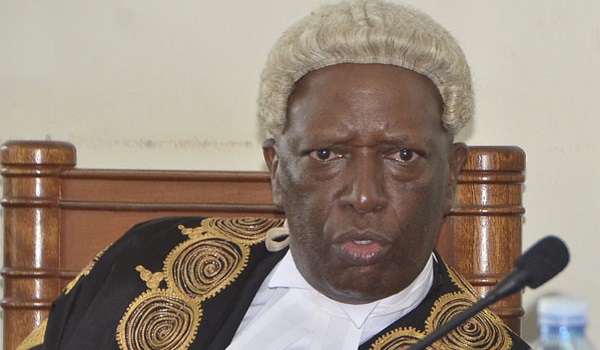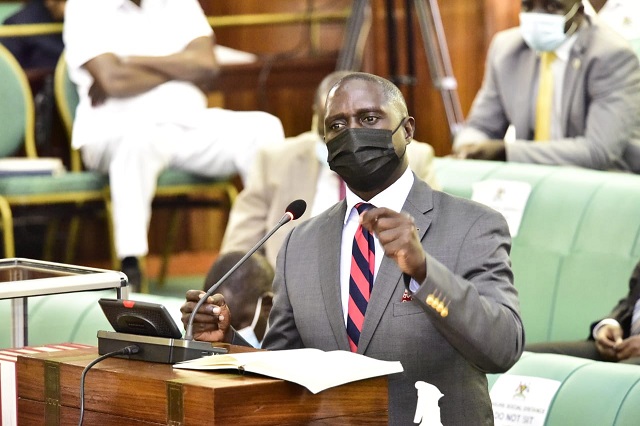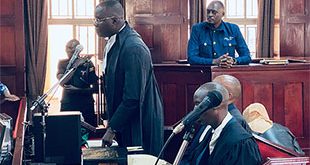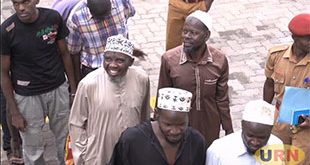
Justice Kakuru who wrote the main judgment agreed with the petitioners that the petition raises an issue for constitutional interpretation and that the section infringes on the freedoms provided for under article 29 of the constitution
Kampala, Uganda | THE INDEPENDENT | The Constitutional Court has declared section 25 of the Computer Misuse Act of 2011 null and void. A panel of five justices of the constitution court comprising Richard Buteera, Kenneth Kakuru, Geoffrey Kiryabwire, Elizabeth Musoke, and Monica Mugenyi unanimously ruled that the section on offensive communication is inconsistent with Article 29 (1) of the Constitution.
This particular section provides that “any person who willfully and repeatedly uses electronic communication to disturb or attempts to disturb the peace, quiet or right of privacy of any person with no purpose of legitimate communication whether or not a conversation ensues commits a misdemeanor and is liable on conviction to a fine not exceeding twenty-four currency points or imprisonment not exceeding one year or both”.
The constitutional court verdict stems from a petition filed by City Lawyer Andrew Karamagi and Robert Shaka in 2016 arguing that the section contravenes Article 29 of the constitution, which is the supreme of Uganda that protects freedom of conscience, expression, movement, religion, assembly, and association.
They noted that this section is an insidious form of censorship that restricts the free flow of opinions and ideas essential to sustain the collective life of the citizenry in the digital age, it is vague and overly broad. They also argued that there is no evidence that government could not achieve the intended purpose with less drastic measures.
They hence asked the court to direct the office of the Directorate of Public Prosecution-DPP to stay the prosecution of all and any citizens currently on trial for violating the “impugned rule and an order staying the enforcement of the Section in question or similar provisions of the law, which disproportionately curtail the enjoyment of the freedom of speech and expression by citizens and also direct the government to pay costs of the suit.

The court set out to determine whether the petition raises any question for Constitutional interpretation, whether the section threatens or infringes on online/digital freedom of expression and is inconsistent with and or contravenes Article 29 (1) of the 1995 Constitution, and whether the petitioners are entitled to the relief sought.
Eron Kiiza, who represented the petitioners argued that the section in question is a matter of constitutional interpretation and that it contravenes section 29 of the Supreme Law. He argued that the provision criminalizes communication, yet it is vague, overly broad, and ambiguous as it does not give a fair warning regarding conduct that is deemed illegal under the right and freedom of speech and expression provided for under Article 29 (1) (a) of the Constitution.
He said the section creates an offense and punishment without precisely defining key terms and phrases like “disturbing the peace, quiet, and privacy of anyone” and “with no purpose of legitimate communication”.
“The terms are broad and vague because there are no attempts to define them and cannot be defined. The result is that innocent persons are roped together with those who are not,” argued Kiiza adding that the section is unnecessary, unjustifiable, and disproportionate restrictions to the freedom of expression and speech.
#Uganda authorities must reform other problematic sections of the Computer Misuse Act that could be used to criminalize the work of the press & ensure all the country’s laws are compatible with the standards of freedom of speech in a democratic society.https://t.co/099RBKDSRc
— Committee to Protect Journalists (@pressfreedom) January 10, 2023
The government represented by the attorney general denied the allegations in the petition and described it as misconceived. Justice Kenneth Kakuru who wrote the main judgment agreed with the petitioners that the petition raises an issue for constitutional interpretation and that the section infringes on the freedoms provided for under article 29 of the constitution.
“In a democratic and free society, prosecuting people for the content of their communication is a violation of what falls within guarantees of freedom of expression in a democratic society,” he ruled. The justice referred to General Comment 34 of the United Nations Human Rights Committee, which stated that any limitation on freedom of expression must be absolutely necessary.
He noted, the UN special rapporteur on freedom of expression stated that UN member states are only permitted to prohibit such limitation through criminal section only for four types of expression under international law; child pornography, direct public Incitement to genocide, advocacy of national, racial, religious hatred that constitutes Incitement to discrimination, hostility or violence and Incitement to terrorism.
“I find that the impugned section is unjustifiable as it curtains the freedom of speech in a free and democratic society. Secondly, section 25 of the Computer Misuse Act No.2 of 2011 does not specify what conduct constitutes offensive communication. To that extent, it does not afford sufficient guidance for legal debate,” ruled Justice Kakuru.
Very good news!
The Constitutional Court has this morning agreed with myself and Robert Shaka about the unconstitutionality of Section 25 (on offensive communication) of the Computer Misuse Act.
Hats off to our great team of lawyers—@IsaacSsemakadde, @nickopiyo and @kiizaeron. pic.twitter.com/ZEcRrY8c9Z
— Karamagi Andrew (@karamagi_andrew) January 10, 2023
He also concurred with the petitioners that the section is vague, overly broad, and ambiguous and concluded that it is inconsistent with and is in contravention of Article 29 (1) of the Constitution, Article 19 (2) of the International Covenant on Civil and Political Rights and Article 9 (2) of the African Charter on Human and People’s Rights.
Kiiza was happy with the Court’s decision describing it as a success in the fight for the freedoms of Ugandans. He said that government uses such laws to limit people’s freedoms and silence critical voices.
It is under this section that exiled Dr. Stella Nyanzi and novelist Kakwenza Rukirabashaija were charged due to their writings on social media that were said to have offended some members of the first family. With this decision, any cases which were still ongoing that resulted from this section can’t continue.
CLICK TO READ THE FULL JUDGMENT
*****
URN
 The Independent Uganda: You get the Truth we Pay the Price
The Independent Uganda: You get the Truth we Pay the Price




The Computer Misuse Act was misinterpreted by parliament.